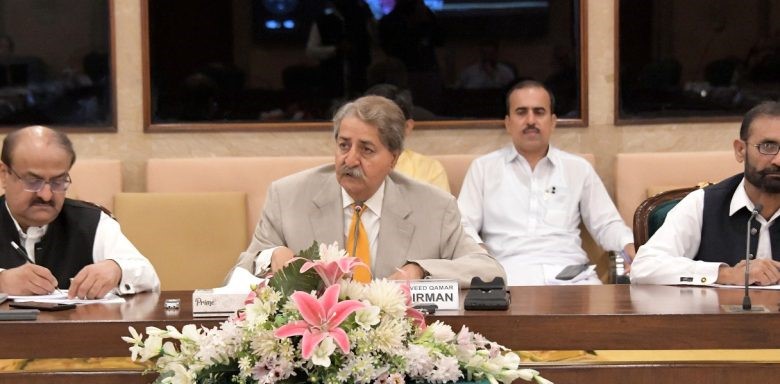By Staff Reporter
ISLAMABAD: The International Monetary Fund (IMF) has shot down the government’s proposal for a 25% tax rebate for teachers and researchers from July 1, 2025, Federal Board of Revenue Chairman Rashid Mahmood Langrial told lawmakers on Saturday.
Langrial told the National Assembly Standing Committee on Finance that the FBR had lobbied the IMF twice for the rebate, only to face firm resistance. “The IMF wants harmonisation of taxes and has not allowed the said tax rebate to teachers and researchers,” he said.
With the fund’s veto in place, Langrial said the government could tap its budget to provide a subsidy for educators, though no firm commitment was made.
Nafeesa Shah, a lawmaker from the Pakistan Peoples Party, urged the government to consider a special allowance for teachers to offset the lost rebate. But State Minister of Finance Bilal Azhar Kayani quickly dampened expectations, warning, “There is no fiscal space available in 2025-26” to fund such measures, a reflection of Pakistan’s tight budgetary constraints under IMF scrutiny.
Crackdown on Tax Fraud
Amid the tax rebate debate, the committee greenlit a revised framework for arresting tax fraud suspects, a move aimed at bolstering enforcement while curbing potential abuses.
Langrial detailed the safeguards baked into the procedure, noting that arrests would hinge on four conditions: a credible risk of the accused fleeing, evidence tampering, tax fraud exceeding Rs50 million, or failure to respond to three notices.
To ensure oversight, any arrest would require the nod from three FBR board members, including the Member IR (Operations) and Member Legal. “The FBR has its own jails to keep persons involved in tax fraud, and it can also use other jails for this purpose,” Langrial added, signaling a robust infrastructure to back the crackdown.
Tax Tweaks Target Non-Filers, Salaried Class
The committee also waded into a slew of tax adjustments. It endorsed a hike in the withholding tax on cash withdrawals by non-filers, those not registered with the tax system, from 0.6% to 0.8%, though it rebuffed a Senate proposal to push it to 1%. For salaried individuals, Langrial clarified that a 1% tax would apply only to those with taxable income between Rs600,000 and Rs1,200,000, sparing lower earners.
On the pension front, a significant shift emerged: the FBR has scrapped an income tax exemption for pensioners, but only pensions above Rs10 million will now face taxation, a change formalized by amending the Income Tax Ordinance.
SCRA Investment Rules
Another point of discussion was the FBR’s proposal to impose a 12-month holding period for investments in Special Convertible Rupee Accounts (SCRAs) to qualify for a concessionary tax regime under the Finance Bill 2025-26. Committee Chairman Naveed Qamar pushed back, arguing that such a lengthy lock-in could scare off investors. “The condition of ‘holding period’ would discourage investment in the SCRA,” he said, advocating for a shorter window of 3-6 months.
Langrial conceded the point, noting the FBR had consulted the State Bank of Pakistan (SBP) and could settle on six months with cabinet approval. Muhammad Ali Malik, SBP’s executive director, joined the discussion remotely from Karachi, defending a longer horizon. “We want to discourage short-term investments in the SCRAs,” he said, adding that a one-year period wouldn’t derail investment flows and could stabilize markets. After haggling, the committee settled on a six-month compromise.
Tracking the Cash Economy
To reel in Pakistan’s sprawling undocumented economy, the FBR unveiled plans to enlist commercial banks in identifying large-scale, unreported transactions. Under Section 175AA of the Finance Bill, banks would supply transaction details tied to specific national identity card numbers (CNICs) flagged by the FBR, without accessing taxpayers’ full income tax returns.
Langrial stressed a targeted approach: “The red flags would be raised only in cases of unreported high transactions.” He sought the committee’s backing to mandate bank cooperation, with the SBP pledging support.
Lawmakers questioned a sub-clause hinting at broader data sharing, prompting Langrial to offer revisions ensuring only CNICs would be exchanged.
Digital Spending
The meeting also spotlighted Pakistan’s digital consumption surge, with Langrial revealing that citizens shelled out over Rs317 billion on online apps in 2024-25, spanning tech titans like Meta, Apple, and Netflix.
The 42.7 million transactions included Rs12.3 billion on Facebook/Meta, Rs6 billion on Apple/iTunes (5.1 million transactions), and Rs5.94 billion on Google (2.3 million transactions). Other heavy hitters included Ali Express (Rs4.9 billion), Netflix (Rs2.79 billion), and Temu (Rs1.8 billion), with a whopping Rs281.4 billion tied to miscellaneous platforms.
To capture this revenue stream, the government rolled out the “Digital Presence” Proceeds Levy Act, 2025, slapping a 5% tax on foreign vendors supplying digital goods and services to Pakistani consumers.
“Foreign vendors providing e-commerce goods or services will be taxed for income tax at 5 percent under the said Act,” Langrial said. Banks and payment intermediaries will collect the levy on transactions, with the committee recommending passage of the bill with minor tweaks.
Copyright © 2021 Independent Pakistan | All rights reserved




